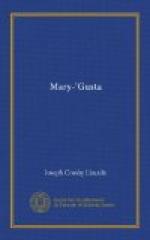Mary-’Gusta entered this school and, doing so, ceased to be Mary-’Gusta, becoming Miss Lathrop to her instructors and Mary to her intimates among the scholars. And at Mrs. Wyeth’s she was Mary or Miss Lathrop or Miss Mary, according to the age, length of acquaintance, or station of the person addressing her. But she always thought of herself as Mary-’Gusta and her letters written to Uncle Shad or Uncle Zoeth were so signed.
She found, after the hard work of beginning, that she could keep abreast of her class in studies without undue exertion. Also she found that, the snobs excepted, the girls at the Misses Cabot’s school were inclined to be sociable and friendly. She made no bid for their friendship, being a self-respecting young person whose dislike of imitation was as strong as ever, but, perhaps because she did not bid or imitate but continued to be simply and sincerely herself, friends came to her. Most of these friends received monthly allowances far greater than hers, and most of them wore more expensive gowns and in greater variety, but she showed no envy nor offered apologies, and if she sometimes wished, being human, that her wardrobe was a trifle more extensive she kept that wish to herself.
Her liking for Mrs. Wyeth grew into a real affection. And the prim and practical matron grew more and more fond of her. The girl came to be considered, and almost to consider herself, one of the family. The “family” consisted of Mrs. Wyeth, Mary, Miss Pease, the other “paying guest,” and Maggie, the maid, and Nora, the cook. Miss Pease was an elderly spinster without near relatives, possessed of an income and a love of travel which she gratified by occasional European trips. She and her closest friend, Mrs. Wyeth, disagreed on many subjects, but they united in the belief that Boston was a suburb of Paradise and that William Ellery Channing was the greatest of religious leaders. They at-tended the Arlington Street Unitarian Church, and Mary often accompanied them there for Sunday morning or afternoon service.
The conviction of the Misses Cabot that youthful manhood was dangerous and to be shunned like the plague Mary soon discovered was not shared by the majority of the young ladies. If Miss Priscilla and Miss Hortense had had their way Harvard University and the Institute of Technology would have been moved forthwith to some remote spot like the North Pole or San Francisco. There were altogether too many “cousins” or “sons of old family friends” calling at the school to deliver messages from parents or guardians or the said friends. These messengers, young gentlemen with budding mustaches and full-blown raiment, were rigidly inspected and their visits carefully chaperoned: but letters came and were treasured and the cheerful inanity of their contents imparted, in strict secrecy, to bosom friends of the recipients.
Mary received no such letters. No cousins or family friends called to deliver messages to her. No photographs of young fellows in lettered sweaters were hidden among her belongings. Her friends in the school thought this state of affairs very odd and they sometimes asked pointed questions.




